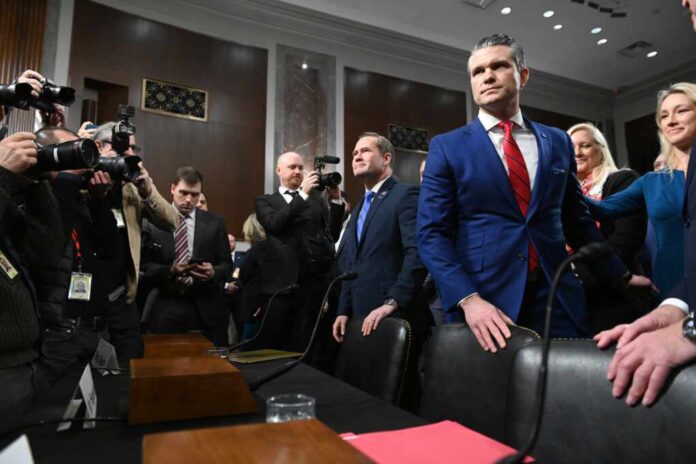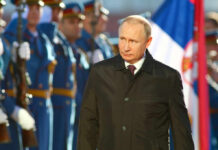
Defense Secretary Pete Hegseth takes firm stance against China’s regional dominance, urging Indo-Pacific allies to increase military spending amid escalating threats.
At a Glance
- Hegseth warned that China is actively attempting to alter the Indo-Pacific region’s status quo through military buildup and aggressive tactics
- The Defense Secretary called on regional allies to boost defense spending similar to NATO countries, some of which are pledging up to 5% of GDP
- Taiwan was highlighted as a critical flashpoint, with the Trump administration planning to increase arms sales to deter Chinese aggression
- The U.S. plans to enhance its military presence in the region while maintaining it doesn’t seek conflict with China
- China condemned Hegseth’s remarks as provocative, labeling the U.S. a “troublemaker” for regional peace
Hegseth Draws Line in the Sand Against Chinese Aggression
U.S. Defense Secretary Pete Hegseth delivered a resolute message to Indo-Pacific allies at the Shangri-La Dialogue security summit in Singapore, emphasizing America’s unwavering commitment to the region despite growing Chinese threats. Speaking with characteristic directness, Hegseth affirmed that the United States would neither be pushed out of the Indo-Pacific nor allow its allies to face intimidation from China. He specifically condemned Beijing’s efforts to reshape the regional power balance through military expansion and increasingly aggressive tactics in contested areas like the South China Sea.
Pentagon chief Pete Hegseth called on Indo-Pacific allies to increase their defense spending in the face of a "real" threat from China. He made the remarks at the Shangri-La security summit in Singapore. https://t.co/NXu6l0uTM0 pic.twitter.com/IbKZRlRe09
— DW News (@dwnews) May 31, 2025
Call for Increased Defense Spending Among Allies
In what may surprise some observers, Hegseth pointed to European NATO members as models for defense spending that Indo-Pacific nations should emulate. This marks a significant shift in American diplomatic messaging, as European allies have historically been criticized for underinvesting in defense.
Hegseth noted that even Germany, long reluctant to substantially increase military expenditures, has committed to higher defense budgets. The message was clear: America’s Indo-Pacific partners must take greater responsibility for their own security rather than relying predominantly on U.S. protection.
“It is hard to believe I can say this, but Asian allies and partners should look to countries in Europe as a newfound example. NATO members are pledging to spend 5 percent of their GDP on defense, even Germany”, Hegseth said.
This push aligns with President Trump’s long-standing position that allies should contribute more to mutual defense arrangements. The administration’s strategy appears focused on developing partnerships based on shared security interests without imposing American political values or cultural expectations on sovereign nations. This approach represents a continuation of Trump’s first-term foreign policy principles, prioritizing practical cooperation over ideological alignment.
Taiwan as Critical Flashpoint
Taiwan emerged as a central concern in Hegseth’s address, with the Defense Secretary warning of potentially catastrophic consequences should China attempt to forcibly seize the island democracy. The Trump administration reportedly plans to substantially increase arms sales to Taiwan, potentially exceeding the $18 billion in defense equipment approved during Trump’s first term. This strategy represents a departure from the Biden administration’s approach, which saw reduced arms transfers to the island nation despite escalating Chinese pressure.
Beijing’s response to Hegseth’s remarks was predictably hostile. The Chinese embassy condemned the Defense Secretary’s statements as provocative and labeled the United States a “troublemaker” undermining regional stability. China maintains that Taiwan is an inseparable part of its territory and has intensified military exercises around the island in recent months. Hegseth’s comments signal that the U.S. intends to counter Chinese pressure through enhanced deterrence measures rather than diplomatic concessions.
Strategic Realignment and Regional Commitments
Addressing concerns about America’s global military posture, Hegseth explained recent redeployments of U.S. forces as temporary measures to address urgent national security priorities, including securing the southern border and protecting interests in the Middle East. He reassured allies that these adjustments would not diminish America’s Indo-Pacific commitments. To demonstrate this commitment, Hegseth outlined plans to enhance U.S. military presence in the region, including deploying advanced capabilities to the Philippines and conducting substantial live-fire exercises in Australia.
Hegseth’s absence from the Shangri-La Dialogue raised eyebrows among security experts. The Defense Secretary used this platform to clarify that while the U.S. does not seek conflict with China, it remains prepared to defend its interests and those of its allies throughout the region. The message underscored that increased defense spending by Indo-Pacific partners would be mutually beneficial, allowing the United States to allocate more resources to countering China’s expansionist ambitions while reducing the security burden on American taxpayers.

























